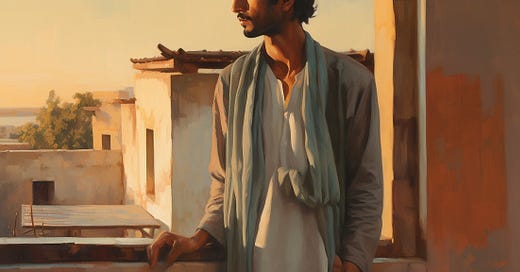Dear friends and supporters of Daily Philosophy,
Last week I published a new video in the Shortest History of Western Philosophy series. This is, as the name suggests, a very short chronological overview of the main names in Western philosophy and a sentence or two about each one. The purpose of this project is mainly to give my first-year students (and everyone else who might be interested) a rough idea about how philosophy developed from the ancient times to today. If this sounds like something you’d like to watch, the first two videos are here. One is around six, the other around 11 minutes, so it’s not a huge time investment to have a look:
Today, we’re coming to the third part of our reading of Hermann Hesse’s Siddhartha, the life story of a young Hindu man at the time of the Buddha.
In the beginning of the book, discussed in the first post in this series, young Siddhartha leaves his home village together with his friend Govinda, and they join a group of ascetics who live in the wilderness. They stay with them for three years, but slowly Siddhartha realises that the whole wisdom of life cannot consist in only running away from it and hiding among wild animals. So he and Govinda travel on, following rumours of the appearance of the Buddha, a wise man who has found the secret to end all suffering. They meet the Buddha, and Govinda becomes a Buddhist monk, but Siddhartha has his doubts: of all the monks in the Buddha’s garden, only one seems to him to be truly enlightened: the Buddha himself. And he is also the only one achieved his enlightenment without following the Buddhist teachings. Siddhartha questions whether enlightenment can be taught at all. Perhaps one needs to arrive at it through the process of experiencing life itself. He parts from the Buddha and from Govinda and makes his way towards the next town.
There he meets Kamala, a thoughtful courtesan who likes him and helps him get a job as a merchant’s assistant. In time, Siddhartha’s three special abilities (“I can think. I can wait. I can fast”) prove to be a key for success, not only in the wilderness but also in the world of commerce. Siddhartha makes a fortune without ever really wanting to, and feels increasingly trapped in his life of luxury, while he feels that his dream of the enlightenment keeps receding into the distance. One day, he cannot bear his existence as a man of the world any more. In the night he flees from his life. Without saying farewell, he walks out of his garden, leaving it all behind forever.
In the same hour of the night, Siddhartha left his garden, left the city, and never came back. ...
When she [Kamala] received the first news of Siddhartha’s disappearance, she went to the window, where she held a rare singing bird captive in a golden cage. She opened the door of the cage, took the bird out and let it fly. For a long time, she gazed after it, the flying bird. From this day on, she received no more visitors and kept her house locked. But after some time, she became aware that she was pregnant from the last time she was together with Siddhartha.
This is a premium post for paying members; if you’d like to join us, just hit this little button. All of Hesse’s wisdom on life, and much more, can be yours for the price of two coffees a month:
By the River
Siddhartha walked through the forest, was already far from the city, and knew nothing but that one thing, that there was no going back for him, that this life, as he had lived it for many years until now, was over and done away with, and that he had tasted all of it, sucked everything out of it until he was disgusted with it. Dead was the singing bird he had dreamt of. Dead was the bird in his heart. Deeply, he had been entangled in Sansara, he had sucked up disgust and death from all sides into his body, like a sponge sucks up water until it is full. And full he was, full of the feeling of been sick of it, full of misery, full of death, there was nothing left in this world which could have attracted him, given him joy, given him comfort.
So Siddhartha stumbles into the forest, not knowing where he’s going or why. He crosses the forest and arrives at a river, and there he suddenly stops. He recognises the river he crossed as a young man, when he first came to this city. Then he knew where he was going — but where is he going now?
Keep reading with a 7-day free trial
Subscribe to Daily Philosophy to keep reading this post and get 7 days of free access to the full post archives.





